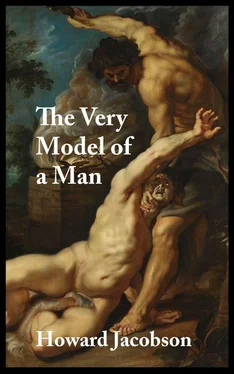He does not shake off the prophet. Nor chill his ardour. Nor put a stop to his marvelling, his gratitude, his solicitations, his hand-patting. By morning, Cain has agreed that a man is the author of his consequences and the owner of his future, that he has an obligation to be curious about his children’s children, and his children’s children’s children, that he in particular, as opposed to man in general, owes a more implacable commitment to the Cainite cause, must not be satisfied with touching the hem of disobedience, but must raise its skirt for everyone in Babel to see, unless he would argue that he has come to town only as a tourist. Moreover, he has promised to cherish the woman in Zilpah, promised to visit Sisobk at the House of Hearsay and Hermeneutics, and promised to accompany him in the very near future on a pilgrimage to a watering hole outside Padan-Aram, where a damsel destined to be the mother of warring millions will one day slake the thirst of Eliezer’s camels from a narrow-necked earthenware pitcher. More pots.
‘Your solemn oath?’
Cain fiddles with the hem of honesty. ‘Solemn!’
But he is so concerned now, in sight of his lodgings, to have his hand returned, yet so unwilling to go back to his room and find the woman in Zilpah waiting for him, rump-ready, that when a ringleted, stiff-necked, ancient infant, with a face hidden in its own shadows, thrusts a note up at him, saying
YOUR LIFE IS IN
DANGER
FOLLOW
ME
he makes no bones about following.
‘Welcome,’ says Preplen, ‘to my home. Fratricidal greetings. Or do I mean fraternal?’
‘From whom?’
‘What do you mean from whom? From me! Come inside and I will fix you greetings from the rest of the family.’
‘From whom am I in danger?’
Preplen scans the skies. ‘From whom aren’t you in danger in this place?’
He gathers up the ancient infant as though it were milk left on his doorstep, and waits for Cain to cross the threshold. There is no urgency about his movements. Whatever is going to happen to Cain, it isn’t going to happen to him here. By the calm conviction with which he shuts and bolts his door, he means his guest further to deduce that this is probably the only house in Babel where he can be sure of that.
‘Meet the family.’
Cain already has, or at least has met their eyes, boring into his from the front row of the theatre, in search of whatever resemblance Preplen has talked to them about. Looking at them lolling uncomfortably on cushions, shipwrecked in their own home, it suddenly occurs to him that he may have been brought here for no other purpose but to compare feet.
‘My wife Nanshe — goddess of springs and waterways. Nice, eh? Her real name’s Naomi, but we thought that would be a bit of a give-away. And these are Tiras, Talmai, Talmon, Tekel and Telem — otherwise Jabal, Jubal, Tubal, Gether and Mash. You can’t be too careful. Girls…’
Cain cannot conceal surprise.
‘Thought they were boys? Good. Good. You’re meant to. Girls, kiss your Uncle Cain.’
‘I’m not your uncle,’ Cain says. He thinks of adding, ‘I am no one’s uncle,’ but does not know how to empty the statement of an anguish he doesn’t choose to feel.
His coldness may be one reason they do not, as he feared, swarm over him like cockroaches; but the furniture is another. They cannot get up from it, they cannot rise without falling, certainly they cannot manage anything as simultaneous as a swarm. Cain takes the opportunity of their confusion to extend a hand to Nanshe. She too is sunk in sumptuousness, so well-sprung that in stretching to meet him she slithers sideways down the sofa and comes to rest in a chasm between two feathery squabs.
Because he does not want to see what is happening to Nanshe’s wig in the course of this manoeuvre, Cain commands his gaze to travel round the room. Not since God the Great Draper recurtained the heavens to impress his lactating mother has he been witness to such excited festoonery. Burgundy chiffon billows from the ceiling. Organzine the colour of peach-blossom swathes every window, sighing like a young girl’s chest whenever there is a breeze. Not a wall is bare. Not a chair lacks covers for its covers. Not a doorway is without hanging tassels of gauze, twined in a riot of hot transparency.
‘It wasn’t like this when we got it,’ Preplen explains. ‘You know how the Shinarites live.’
Cain does. ‘Heathenish?’
Preplen pulls a face and rights his wife. ‘Worse than heathenish. Primitive. Since you told me about partridges, I am better able to guess what went on here.’
Cain is sympathetic. ‘You didn’t find feathers?’
‘Feathers… bones…’ Preplen can barely bring himself to remember. ‘. . sticks…’
‘Sticks?’
‘Don’t ask me to be specific. I don’t want to know what they did.’
And doesn’t want his family to know either. He makes this plain by lowering his voice and turning his profile into even more shadow than it normally enjoys.
Cain thinks of the lustrous, high-shouldered Shinarites on the streets of Babel and is at a loss to imagine what employment they might have found, other than in the garden, for sticks. Far more barbaric mysteries reside, to his eye, in the fringes and tassels that canopy the poet’s tabernacular shrine to family. Nowhere in Babel — not in a face, not in a shuttered room, not in the night sky — has he seen anything so black as the coals that gleam under Nanshe’s skew wig. Nothing in Babel — whose marshes have been cleared, whose rivers are fragrant — recalls more vividly to him the first slitherings of life in slime than Nanshe’s brood, five baby crocodiles with their mouths open, losing their balance on the muddy banks.
‘Why did you tell your daughters I am their uncle?’ he asks, out of the blue.
‘Daughters? You think they’re girls? Good. Good.’
‘Why?’
‘It’s just a manner of speaking. Family is as family does.’
‘And how,’ asks Cain, ‘does this family do?’
He doesn’t mean it to be rude. Just shapely. But syntactical shape is not always the best friend of easy conversation.
All his years of sleeping on three or four pillows too many tell on Preplen. His neck clicks twice, sinks a couple of notches into his shoulders, and locks. If Cain wants to see his lips move, he has to walk around him, lower his own head and look up. Two parrots. Preplen’s message is clear, though, wherever one stands. ‘We are children of the same God,’ he says. ‘We are planted in the house of the same Lord. My children are as saplings that grow straight. How straight do you grow, Cain?’
‘It is a little late for me to be worrying about that,’ Cain reminds him.
‘I see. I see. Having committed one sin you are now free to commit all the others.’
‘I don’t know about all.’
‘Having broken your parents’ hearts once by taking from them a beloved son, you will break them a second time by taking to yourself a heathens’ whore.’
Cain looks from the wreck of shadows which is Preplen to the tropical plantation which is his family. Is this fit language, he wonders, for the ears of saplings? But they show no signs of having heard anything amiss. They still wallow in upholstery. And through Nanshe, too, the word whore seems to have passed like a speeding missile, leaving no trace of its trajectory. She smiles, blacker than beetles.
Whatever the proprieties in this greenhouse, Cain knows better than to bother defending a woman’s reputation. ‘I see no reason why my private life should travel so far abroad,’ he simply says. ‘It has already gone far enough.’
‘“Ye shall do my statutes,” the Lord said. He didn’t say, “Ye shall worship partridge semen in the company of harlots.”’
Читать дальше











